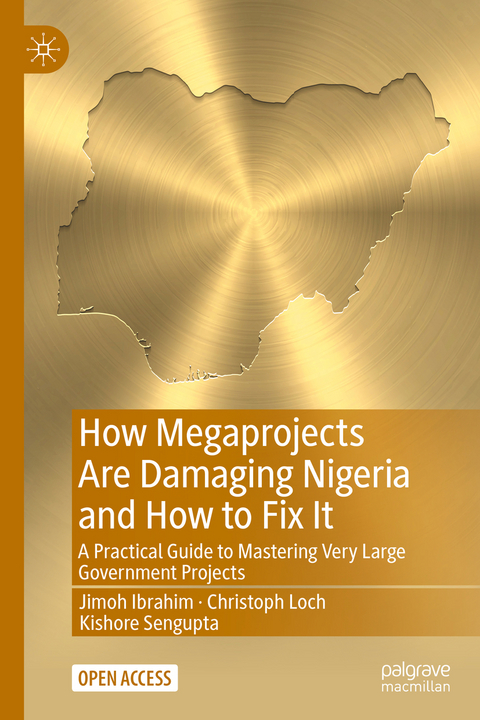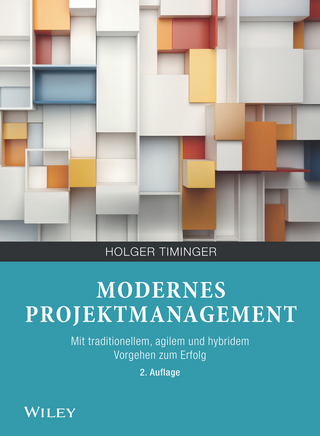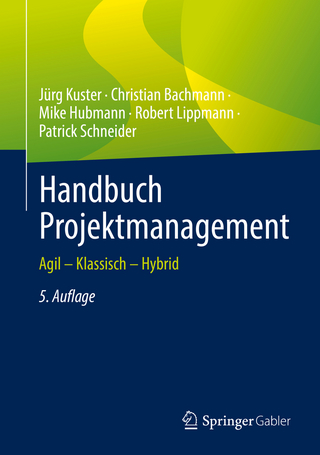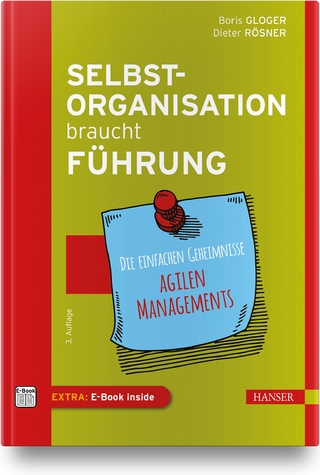
How Megaprojects Are Damaging Nigeria and How to Fix It
Springer International Publishing (Verlag)
978-3-030-96473-3 (ISBN)
Since 1960, two-thirds of very large governmental projects in Nigeria have not only failed, but been abandoned mid-course. This presents a bigger failure rate than mega projects elsewhere, and yet there is no available data or analysis to help us understand the reasons behind such failures. This book provides an authoritative examination into why very large projects in Nigeria have failed so badly, and provides practical recommendations on how the Nigerian government can improve its project performance.
Drawing on data from 38 very large projects (19 completed and 19 abandoned) with a total budget of over $25B, this book presents detailed analysis of these projects and in-depth case studies 11 of the projects, and presents lessons for improvement. Through this, the authors have identified a small number of key success drivers, and argue that making moderate improvements on any of them would, on average, save hundreds of millions of dollars on one large project alone.
This book is a game-changer in the management of government mega projects in Nigeria. With clear implications for other developing economies, this is a vital resource for project management practitioners, executives and civil servants.
This is an open access book.
lt;p> Jimoh Ibrahim is a prominent businessman in Nigeria, with business interests in hotels, insurance, banking, oil and gas, real estate, and airlines. He is also currently completing his Business Doctorate degree at the University of Cambridge Judge Business School. He holds a Bachelor's degree in law and a Master of Public Administration from the Obafemi Awolowo University Ile Ife, Nigeria, in addition to a Master of Science in Mega Project Management from the University of Oxford Said Business School, and a Master of Business Administration from the University of Cambridge. He is also an alumnus of the Harvard Law School and holds other degrees.
In the public sector, Jimoh Ibrahim was in 2005 appointed as the Honorary Consul of the Democratic Republic of Sao Tome and Principe to the Federal Republic of Nigeria for life in 2007. He was appointed by the President of the Federal Republic of Nigeria as the Chairman of the Board of Directors of the Nigeria Corporate Affairs Commission (equivalent of the British Company House). In addition, the president of Nigeria conferred on him the higher National Honours of "Officer of the order of the Federal Republic" OFR and "Commander of the Order of Federal Republic" CFR (the equivalent of the British Knight Commander of the Most Excellent Order of the British Empire CBE). Ibrahim is currently working on establishing a new University in Nigeria.
Christoph Loch is Professor of Operations and Technology Management at the Cambridge Judge Business School. He served as the Dean of the school from 2011 to 2021, in which period the school grew from £25M to £60M in annual revenues and rose in Financial Times rankings into the global top 20. Professor Loch is globally known for research on innovation, operations management, and project management, and he has received a research award from the Project Management Institute (PMI). He is a well-known speaker and instructor on innovation and on project management. He has written a previous book on project management in addition to books on innovation and management quality in manufacturing.
Kishore Sengupta is Professor of Operations and Technology Management at the Cambridge Judge Business School. He is an internationally known researcher on project management, and he is the programme director of the project management executive education offering at the Cambridge Judge Business School.
1 Introduction: The Project Abandonment Problem.- References.- 2 What We Know About the Management of Very Large Projects.- 2.1 Project Success Factors as Lists.- 2.2 The Project Success Frameworks of Miller and Lessard and Morris and Hough.- 2.2.1 Miller and Lessard (2000).- 2.2.2 Morris and Hough (1987).- 2.3 The Nigerian Context.- 2.4 The Extended Theoretical Framework.- 2.5 What About Corruption?.- References.- 3 Structure of the Investigation.- 3.1 Overview of the Approach Taken in This Study.- 3.2 Construction and Execution of the Survey.- 3.3 Construction of the Sample of Projects.- 3.4 Construction of the Case Studies.- Appendix: Full Questionnaire as It Was Administered.- Our Request.- Project Variables.- References.- 4 A Description of the 38 Matched Projects.- 4.1 Lagos-Ibadan Express Road.- 4.2 Lagos-Badagry Express Road.- 4.3 Third Mainland Bridge.- 4.4 Second Niger Bridge.- 4.5 Egbin Power Station.- 4.6 Calabar Power Station.- 4.7 Zungeru Hydropower Plant.- 4.8 Delta State (Oghareki) Power Plant.- 4.9 Shiroro Hydroelectric Power Station.- 4.10 Omoku Power Plant Station.- 4.11 Mambilla Hydroelectric Power.- 4.12 Ajaokuta Steel Project.- 4.13 Kanji Dam.- 4.14 Otukpo Dam.- 4.15 Nigeria Satellite 2.- 4.16 Nigeria Satellite 1.- 4.17 Airtel Nigeria.- 4.18 Nigerian Telecommunications Limited (NITEL).- 4.19 Godswill Akpabio International Stadium.- 4.20 (Samuel) Ogbemudia Stadium.- 4.21 Abuja International Airport.- 4.22 Lagos MMA2 Airport.- 4.23 Yenagoa International Cargo Airport.- 4.24 Jigawa Airport Project.- 4.25 Tin Can Island Port.- 4.26 Calabar Seaport.- 4.27 Victoria Garden City (VGC) Housing Estate.- 4.28 Festac Town Federal Housing Estate.- 4.29 1004 Housing Estate.- 4.30 Abuja Mass Federal Housing Project.- 4.31 Olusegun Obasanjo Presidential Library.- 4.32 Abuja National Library.- 4.33 Nigerian Youth Empowerment Scheme (N-Power).- 4.34 Nigeria Subsidy Reinvestment and Empowerment Programme (SURE-P).- 4.35 Lagos State Waste Management Authority (LAWMA).- 4.36 Cleaner Lagos Initiative (Visionscape).- 4.37 University College Teaching Hospital (UCH) Ibadan.- 4.38 University of Abuja Teaching Hospital (UATH).- References.- 5 Insights from the Analysis of the Questionnaires.- 5.1 Variable Distributions and Variable Capability to Detect Differences Across Projects.- 5.1.1 Each Respondent Type Adds Unique Perspectives and Information.- 5.1.2 The Variables Capture Robust Differences Between Abandoned and Completed Projects.- 5.2 Condensing Variables into Aggregated Success Factors.- 5.2.1 Approach.- 5.2.2 Identifying the Factors.- 5.3 Econometric Prediction of Project Completion.- 5.4 Econometric Prediction of Cost and Schedule Overruns for Completed Projects.- 5.4.1 Effect of Variables on Budget Overruns.- 5.4.2 Effect of Variables on Schedule Overruns.- 5.5 The Corrosive Effect of Corruption.- Appendix 1 Correlations Among Independent Variables Across All 114 Responses.- Appendix 2 Factor Analysis.- Appendix 3 Specification of the Logistical Regression.- Appendix 4 The Logistical Completion Probability Regression by Respondent Group.- Appendix 5 Robustness Analysis: Cost Overrun Regressions by Respondent Group.- Appendix 6 Robustness Analysis: Schedule Overrun Regressions by Respondent Group.- 6 Two Library Projects.- 6.1 The National Library of Nigeria in Abuja: An Abandoned Project.- 6.1.1 Project Initiation.- 6.1.2 Contract Signature and Execution.- 6.1.3 Conclusion.- 6.2 Olusegun Obasanjo Presidential Library: A Completed Project.- 6.2.1 Project Initiation.- 6.2.2 Project Execution and Outcome.- 6.2.3 The Difference Between the Two Projects: In the Words of Former President Obasanjo.- References.- 7 Two Bridge Projects.- 7.1 The Second Niger Bridge: A Stalled Project.- 7.1.1 Project Initiation.- 7.1.2 Contract Disputes and Recontracting.- 7.1.3 Continued Stalling.- 7.1.4 Diagnosis of the Reasons for Failure, in the Words of (Former) President Jonathan.- 7.1.5 Conclusion.- 7.2 The Third MainlandBridge: A Completed Project.- 7.2.1 Introduction.- 7.2.2 Starting and Stalling.- 7.2.3 Restarting the Project Under President Babangida.- 7.2.4 Project Execution and Outcome.- 7.2.5 Conclusion.- References.- 8 Two Power Plants.- 8.1 Egbin Power Station, Ikorodu Lagos State: A Completed Project.- 8.1.1 Initiation and Completion.- 8.1.2 Success Conditions and Challenges.- 8.1.3 Privatization and Trouble.- 8.2 The Calabar Odukpani Power Station: Completed but with Little Delivery.- 8.2.1 Project Initiation.- 8.2.2 Project Complications and Delays.- 8.2.3 Delivery of the Calabar Power Station in 2015.- 8.2.4 What Has Been Delivered? Lessons from the Project.- References.- 9 Two Express Road Rehabilitation Projects.- 9.1 The Lagos-Ibadan Express Road Rehabilitation: A Completed Project.- 9.1.1 Original Construction of the Express Road.- 9.1.2 A Reconstruction Project in a PPP Scheme.- 9.1.3 Restructuring the Project as a Government-Owned Project.- 9.1.4 Discussion.- 9.2 Lagos-Badagry Express Road Rehabilitation: A Stalled Project.- 9.2.1 Brief History.- 9.2.2 Was the Problem the Fault of the Contractor?.- 9.2.3 Dodgy Funding and Accounting.- 9.2.4 Protest, Additional Funding and Patching Up.- 9.2.5 Conclusion.- References.- 10 Two More Power Plants.- 10.1 The Zungeru Dam/Hydropower Plant: A (Soon-to-Be) Completed Project.- 10.1.1 Brief History.- 10.1.2 Enabling Factors of Completion.- 10.2 The Delta State Oghareki Power Plant: An Abandoned Project.- 10.2.1 Initiation.- 10.2.2 The Alleged Corruption.- 10.2.3 Implications.- References.- 11 The Ajaokuta Steel Project.- 11.1 Project Initiation.- 11.2 Project Construction and Cessation by 1988.- 11.3 The PPP Revival of 2000-2007.- 11.4 The State of the Asset.- 11.5 Conclusion.- References.- 12 Insights and Recommendations.- 12.1 Summary and Discussion of the Findings.- 12.2 Developing Solutions: Inspiration from Other Countries.- 12.3 Recommendations.- 12.3.1 Recommendations Part 1: Short-Term Changes.- 12.3.2 RecommendationsPart 2: Longer-Term Structural Changes.- 13 Conclusion: The Government Responsibility.
| Erscheinungsdatum | 14.05.2022 |
|---|---|
| Zusatzinfo | XVIII, 240 p. 53 illus. in color. |
| Verlagsort | Cham |
| Sprache | englisch |
| Maße | 155 x 235 mm |
| Gewicht | 547 g |
| Themenwelt | Wirtschaft ► Betriebswirtschaft / Management ► Projektmanagement |
| Wirtschaft ► Betriebswirtschaft / Management ► Unternehmensführung / Management | |
| Schlagworte | Corruption • Developing Countries • emerging economies • large programmes • open access • Project Governance |
| ISBN-10 | 3-030-96473-6 / 3030964736 |
| ISBN-13 | 978-3-030-96473-3 / 9783030964733 |
| Zustand | Neuware |
| Haben Sie eine Frage zum Produkt? |
aus dem Bereich


